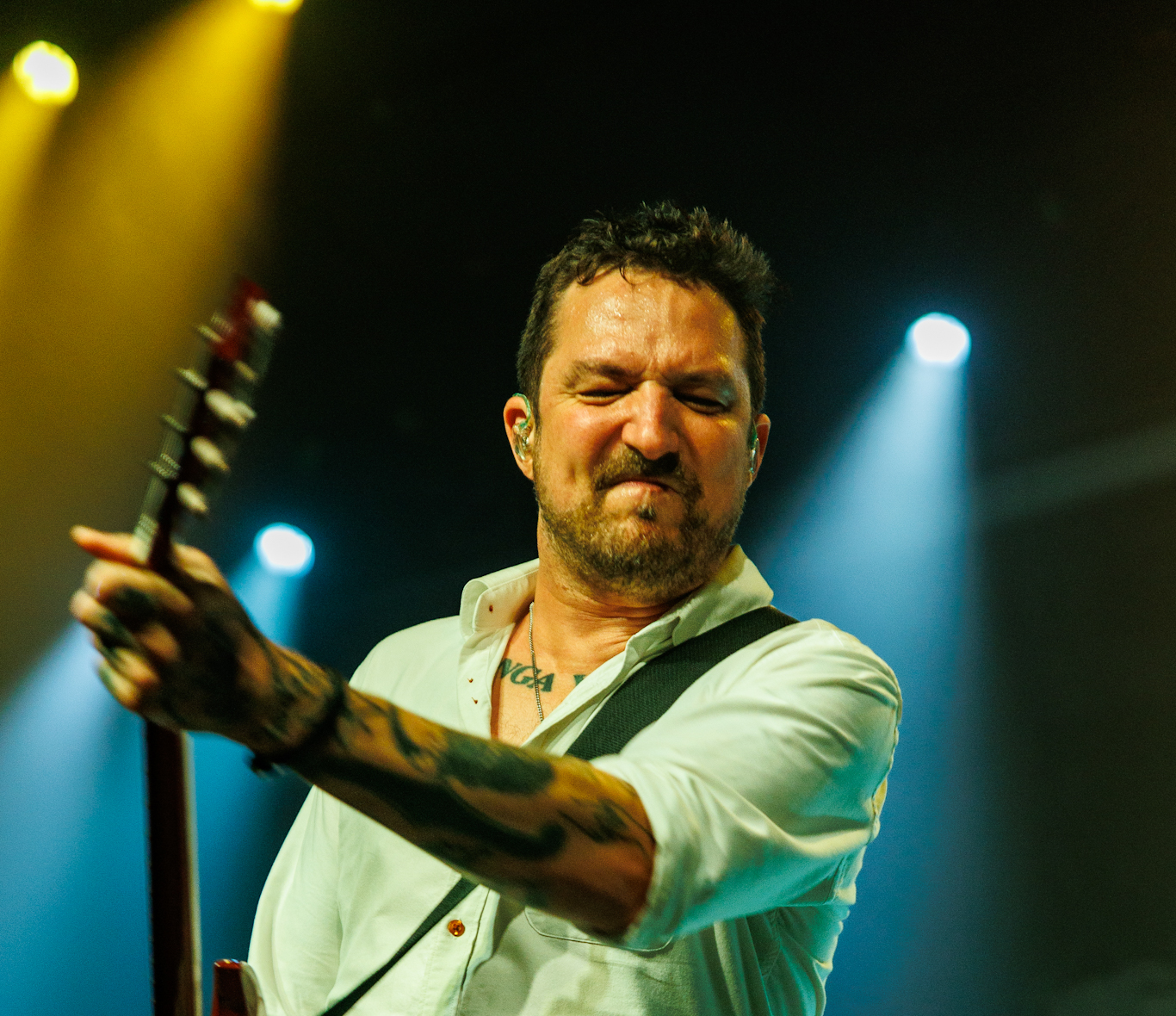
Frank Turner is one of, if not the hardest-working musicians currently active. He tours endlessly and has released nine studio albums to date. The most recent, FTHC rising to number 1 on the UK charts. Album number ten will be recorded at his home, where he set up a recording studio during the pandemic and should be released in early 2024. I caught up with him near the end of his North American tour dates, specifically show number 2,770.
Frank didn’t have a musical upbringing when he was young. He discovered metal after seeing an Iron Maiden poster and got into metal before realizing punk rock. In a conversation naturally laden with Black Flag references, we discuss guitars, the Smiths, Metallica, why Frank works as hard as he does, and why he’s so responsive to his fans.

We talked outside of Bogarts, the venue in Cincinnati, OH, where Frank would soon be playing show number 2,770. He kicked the conversation off, excited about the guitar he had just purchased.
Frank Turner: I just accidentally got a new guitar.
Jesse Yarbrough: Your tour manager said you were going to a guitar shop.
FT: Ah fuck. I’m not much of a guitar collector or guitar nerd; however, the stars aligned. I’ve just finished reading Jim Ruland’s new book about the SST label, Greg Ginn from Black Flags label. He famously played a plexiglass Dan Armstrong guitar. I’ve never seen one in the wild before. I walked in there and finished the book at breakfast this morning. I walked into this guitar store, and there was a plexiglass 1970 Dan Armstrong Ampeg guitar.
JY: I mean, it sounds like fate. You had to buy it.
FT: Yeah, except it cost, really, quite a lot of money. And then I’ve sort of essentially gone halves on it with one of the guys from Bedouin [Sound Clash], but he’s essentially saying that I can have it, and I’m just like, that’s ridiculous. But fuck it; I’m going to play it tonight. You’ll see. It’s beautiful, and it’s an unknown type of guitar.
And, you know, we’ve launched right into this; you didn’t even ask more than one question.
You know, to a degree, you play a particular guitar because of how it plays and sounds. But this is also performance art as well. There are these aesthetic signals you’re sending to the audience. If you play a Strat, that’s one thing, and if you play a Les Paul Jr, that’s different. And the thing about playing Dan Armstrong is that the signal it sends is extremely niche. Like, extremely niche, but there’s like, one out of 200 people will go, “Motherfucker! Is that a Dan Armstrong?!”
And it’s like, “Yes, yes, you understand!” And that sort of niche thing appeals to me, which is probably my problem in life. Anyway, how are you?
JY: I’m doing well. I was going to ask about you playing a red SG on this tour instead of the white Les Paul many of us are used to seeing.
FT: That’s another reason why I brought up my hesitation today. I recently spent money on a red SG Jr, which I love. It’s a fucking fantastic guitar. Particularly the Juniors. My only hesitation about the Dan Armstrong is that it’s insanely heavy, and I’ve had back issues in my life. Usually, one of my choices for playing electric or any guitar is that it’s not too heavy, and the Armstrong is very heavy. The SG Jr and I love this. It’s got two controls. It’s got volume and a tone knob. It’s got one pickup; it doesn’t have a selector or anything. It’s fucking great. And you can wave it around, and it weighs nothing. And it sounds awesome. It roars. It plays very well. So yes, it’s a nice guitar.
JY: So this is still part of the “never-ending tour of everywhere”, which you’ve said previously, is such a great name that you may keep it forever.
FT: Yeah. I first used it in 2007, funny enough, as a name for a tour. And the reason was that during the tour before that, which was the “Sleep Is For the Week tour”, we made a shitload of tour posters. Too many tour posters. This was the point in my time when I still basically did everything. I had a manager, still the same manager now, but I organized the merch and tour managed myself and all this shit. And I’d massively overestimated how many of these posters we would sell. We ended the tour with thousands of spare posters that said, “Sleep Is for the Week Tour, January 2007”.
And it was like, “What the fuck are we going to do with these now?” We ended up using them for insulation around a rehearsal space or something. It’s annoying because we probably could now sell them for something. But the point was for the next tour, slightly sarcastically, I was like, “Well, I’ve got a name for a tour that’s never gonna go out of date, the never-ending tour of everywhere.” And Charlie, my manager, said, “Yeah, I mean, it works.”
So I’ve used it here and there, on and off, returning from the pandemic; I was slightly casting around for tour names. I mean, tour names, who gives a fuck? But for aesthetic approaches, this is a broader point about where I am in my career. From the start of last year forward, I very much feel like a period of restatement of my purpose and going back to basics and starting again. Just in the sense that it’s like I have a new drummer in my band, we have a new record that I’m very happy with. It’s after a pandemic, and it’s like, this is who we are and what we do. And it feels like that tour name fits in with the statement I’m trying to make.
JY: You did the 50 States in 50 Days tour, which you’ve said was ill-advised. Completing something like that is insane because not only are you only the third artist to accomplish it, but, to the best of my knowledge, somehow, none of you got sick, even with COVID still waxing and waning.
FT: Yeah, and it’s funny. I should say that because I got pretty sick on this tour. The thing is, getting sick on tour is a thing that happens. There are ways and means of dealing with it. The number of shows I’ve done with a considerably less than optimal voice situation because I’ve got a cold, and you’re just using brute force to push through it because you have to. I mean, everybody who’s in a touring band does that. I guess some people don’t, but I can’t afford to cancel shows and move on with my life unless it’s physically impossible to do the show.
I started getting sick on this tour. Our immune systems are down a bit after the last three years. And I also feel like the flu has been doing fucking push-ups and getting in shape. It kicked my fucking ass on this tour. Like, severely, to the point we had to pull a couple of shows, which is not a thing I would usually do.
Anyway, going back to last summer, the 50/50 tour. So actually, funnily enough, yesterday, I was watching kind of the halfway point edits of the documentary we are making; it’s coming together. I think it’s going to be cool. But it’s interesting to watch the documentary because, despite the fact it features me quite a lot, it was such a huge undertaking that almost even now, watching the footage feels like I’m watching somebody else do it. I’m kind of like, “Stop! What are you doing? This is a self evidently a terrible idea!” In retrospect, I am blown away that no one got sick. I had some slightly tired voice moments on that tour, but that’s because we did 50 states and 50 shows in 50 days. It’s fucking ridiculous.
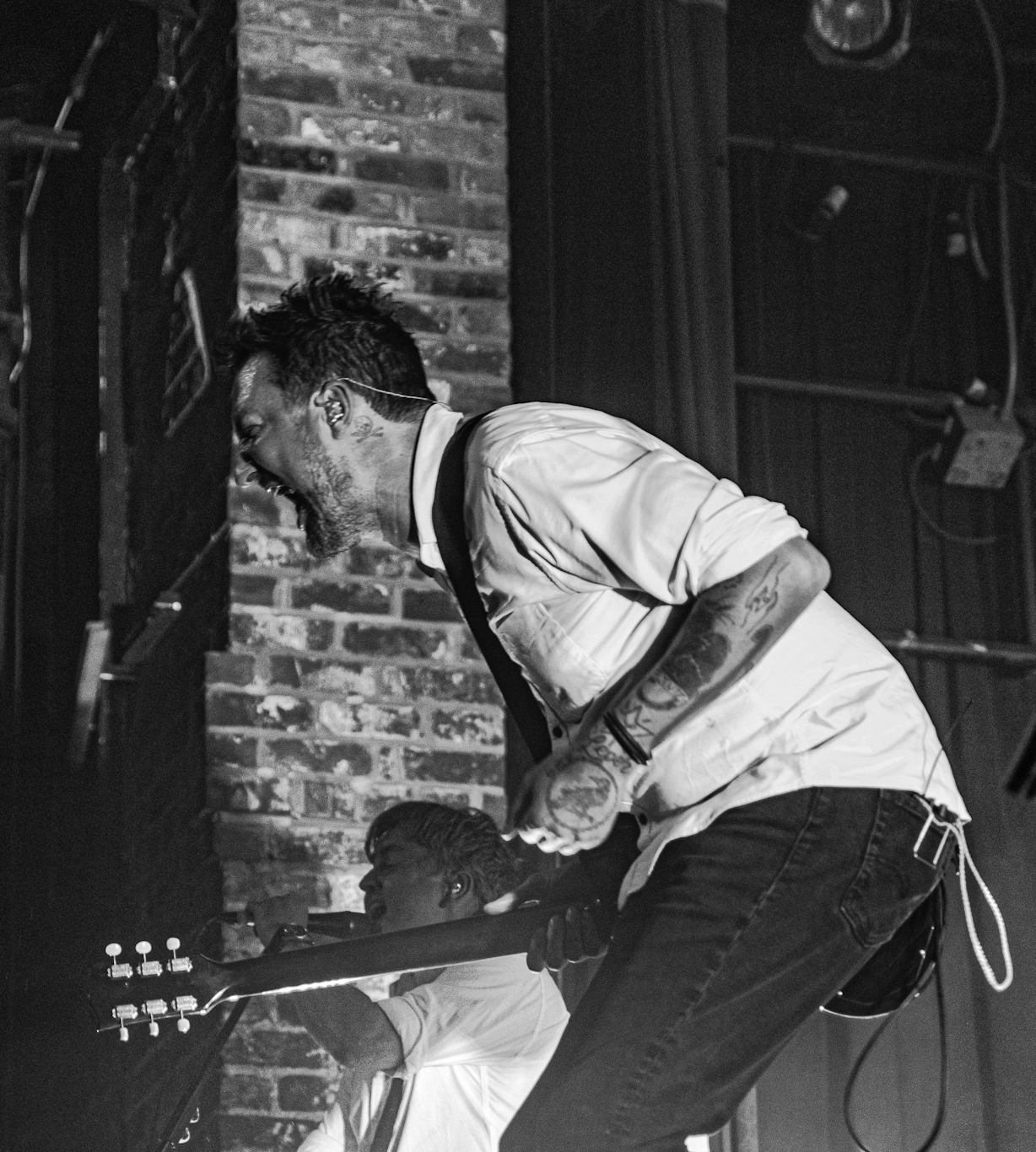
JY: Now that you’ve done that, will you attempt to play on all seven continents to compete with Metallica?
FT: Yeah! I think competing with Metallica, broadly speaking, feels like a fool’s errand. Although I think I’m right in saying I’ve done more shows than them in considerably less time. Speaking of such things, people occasionally ask me, “You’re going for the world record on this kind of thing.”
“No” is the short answer. The reasons for that are many, but one of them is that no one is ever going to beat the bluesmen. Such people like John Lee Hooker and BB King played three shows a day, 364 days a year, for about 50 years. That’s out of sight! Just give up. Go fuck yourself, do you know what I mean?. It’s like those guys played, and that was their life. That was the way that they did their thing. There’s no record of numbers other than it’s just completely insane. But I think I have done more shows than Metallica. More continents will be great. I’ve still not been to South America, which bugs me. So one day, right?
JY: Moving to recent events, I woke up this mourning and saw that Andy Rourke of the Smiths passed away. He leaves behind some truly legendary music. Do you have any reflections on how the Smiths influenced you and what they meant both in your younger years and as you aged?
FT: Well, when it was current, I was a baby in arms. I mean, the Smiths high period is sort of like 82 to 87, which is when I was between the ages of one and six. I’m not sure I was aware of the Smiths when they were going on. I’ve said before that my parents don’t believe in drum kits. As a result of this, my entire kind of musical education, as it were, popular musical education, was completely ass backwards in the sense that I got into it because I was an autodidact. Essentially, I discovered metal and then, punk and then hardcore. When I was 20, I could have told you everything you could want to know about the CroMags and their discography, but I’d never heard a song by Neil Young, ever! And possibly even the Beatles. I was extremely familiar with the Minutemen song “Bob Dylan Writes Propaganda Songs” before I’d ever heard any Bob Dylan songs. It’s ridiculous.
So then I sort of slightly had to go back, and a big part of why I’ve ended up where I am is that I already had something of a music career, and then I discovered Bob Dylan and Bruce Springsteen, and it was like, “Wow, this is fucking great!”
And like everyone else was like, “Uh… yeah.”
And I was like, “Have you heard this shit? This is great! You should check it out! This is an incredible guy!” People just looked at me like I’d lost my mind. Sorry, going back to the Smiths. I mean, I was saddened to hear the news. He was 59, I think, very young; yeah, it’s no fucking age. I have a tremendous amount of respect for the Smiths. I’m not sure that they’re my favourite band ever, I’ll say that. Morrissey has turned into a gigantic prick. This is a shame on many levels, not least because I’ve never been a massive fan of the voice, but he was an exemplary lyricist. When he’s not doing an interview, I’ll still listen to some of what he has to say.
Now and again, there are people who kind of… I’m going to try and say this sensitively, but people pass away, and I’m like, “Fuck, man, that guy was still alive?!” Jerry Lee Lewis died, and I was like, “Jerry Lee Lewis was still alive?!” You know? It seems unfair that somebody from this mess would die within two or three years of Jerry Lee Lewis. That’s fucked, man, because Jerry Lee Lewis was 30 years into his career when they started. Sure. So there’s no justice there.
JY: One thing that strikes me about your shows, and I’ve been to a few of them, is how you interact with the audience and your evident passion for what you’re doing. You give the impression to the audience that it doesn’t matter what tour stop you’re on, that this is the tour stop you’ve been most looking forward to since the plane landed.
FT: [Laughing] Thank you. It’s my plan, my evil plan!
JY: So I don’t know if you’ve read Dave Grohl’s book, but it’s fantastic. I see a lot of similarities between you and him. In his autobiography, he talks about how, essentially, he’s living out his dreams, and he wakes up every day and can’t believe that he gets to do what he’s doing.
FT: Oh, sure. Absolutely. At the risk of being miles up my ass. He’s a generation older than me but has some similar kind of first principles, both ethically and musically kind of thing. And indeed, we hung out one time and got on very well.
So there’s, there’s a story in Henry Rollins’ book, “Get in the Van”, which is a book that I read, like it was an instruction manual, if not a Bible, when I was a kid. I read it so many times. And indeed, I did my first tour when I was 16 because I read “Get in the Van” 19 times in a row.
It was like, what do bands do? Bands go on tour. How do bands go on tour? They book it themselves, okay? I booked my first tour at 16 from a payphone at my school. We did it, and no one came, but we still fucking did it. Anyway, there’s a story in “Get in the Van” where Henry Rollins talks about just after he joined the band, they just left LA to do some shows across the country for the first time. They’re in Tucson or something, and four people have bought tickets. Henry’s all bummed about it, and Greg Ginn pushes him up against the wall and says, “Hey, fuck you, man. These guys paid for a show, and they will get one! It’s got nothing to do with them that nobody else bought tickets. They get the fucking show that they pay for!” Our job is to give them what they pay for kind of thing. So I think it’s a powerful ethic, you know?
Then there’s the Dave Grohl thing. When I was a kid, I wanted to do this more than anything else in the world, and everybody laughed at me when I said that, and I’m still fucking doing it. So fuck everyone. It’s quite a big part of my self-definition, in a way. But also, if I look back at the sort of Nambucca scene that I started on, there are loads of people who are just as talented as I was, if not more so, as songwriters, performers, and the rest. Quite a few of them don’t now work in music because the cards didn’t go their way or the breaks didn’t come to them. I don’t want this to be a patronizing statement, but a part of me feels duty-bound to enjoy my fortune, sort of on their behalf in a way. There are some people I knew from back then who kind of took how things sorted out without grace and with bitterness. I tend not to be super good friends with those people anymore.
My friend Adam was a singer in The Tailors who was probably one of my biggest underlying influences, and he no longer plays. He’s got two kids, and he has a lovely time, but we hang out, and he just thinks it’s fucking great. He loves it, you know? Therefore, I feel duty-bound to have a really good time and do it as hard and as well as I can, sort of for the two of us in a funny way. I don’t want that to be a patronizing statement.
It’s just it’s like if there were a group of 15 of us and the finger landed on me, then I’m carrying the torch for more people. Then to go back to what Dave Grohl said, it’s just fucking ridiculous! I get paid to play the guitar. [Whispers and winks] I’d do it for free. Don’t tell my booking agent.
It’s fundamentally silly on some levels. It’s fucking great. You know, I’m having a conversation with you in Cincinnati. I’ve never been to Cincinnati other than as a touring musician. In fact, until 2018, I’d never been to America other than to go on tour. I had a holiday here in 2018. It was, it was lovely. I’ve been here a lot. I’ve spent a considerable chunk of my life here because I play guitar and sing, which is ridiculous in a good way.
JY: You’re notoriously responsive to your fans, even keeping your email address on your website. It’s unusual. Why do it?
FT: Henry Rollins does it, and oh, this has been it’s been very Black Flag-themed conversation today, but Henry Rollins does it. I wrote to Henry Rollins. I emailed him when I was a kid and wrote a letter to Fugazi, and Guy Picciotto replied, I’m still telling you that story, nearly, oh God, almost 30 years later! The calculus of my effort to the potential impact would make me extremely childish not to bother in some way. At the same time, as I get older, I am trying to sort of not step away from it, but spend less of my day thinking about my emails; I’m just trying to sort of like cordon off time in my day that is email time, and then ignore my emails for the rest of the day kind of thing. When I first got to know my now-wife, she said, “Wow! You spend a lot of time with your emails.”
JY: I understand that she’s currently pursuing her doctorate.
FT: Yes, she’s getting a doctorate in; lemme get this right… counselling psychotherapy.
JY: She’s also a musician and recently released her first record. Will you guys be the punk rock version of Jason Isbell and Amanda Shires?
FT: It’s funny; you should say that, right? The short answer is no because my wife doesn’t want to do it. She doesn’t want me to be her full-time job. She’s not especially interested in touring eight months of the year or anything like that. She has artistic statements to make, likes to play some shows here and there, and is slightly ticking off some bucket list stuff. She opened for Richard Thomson the other day and said, “Cool. I can stop this now.” I don’t know if she will, but I know the feeling.
But, it’s funny that you should mention Jason and Amanda because I have to say not only are those two friends of ours, but they’ve been pretty exemplary to us, or to me, I would say, in terms of how to handle being in a relationship in public. Without getting too far into my personal life, until I got together with my now wife, I had a strict rule about not mentioning anything to do with my partner or my personal life in any public format.
When Jess and I first got together, after a while, she was kind of like, “This is kind of fucked, because it feels like I didn’t exist. It feels like you’re trying to pretend to be still single.” I wasn’t, incidentally. But how do you handle presenting being in a relationship in a public way that’s not gross and overbearing and oversharing? But it’s also confident, and just the way those two handle the fact that it’s like, “Yeah, this is us, this is what we do”, was really helpful for me to look at it.
We toured with Jason a few times. It was an eye-opening tour for me because Jason’s sober, as I’m sure you know, but he’s not like a dry backstage kind of dude. What was interesting about that tour was we were doing kind of arenas with him over here, and the backstage after the show was like a glass of wine and an old Italian tour story by a cloth from the campfire because it was a summer tour. This is as opposed to Jager bombs, trying to find who’s selling cocaine and like, “Ah, let’s try and go get laid!” which I have also experienced in my time. It was just such a cool way of seeing that moderation is possible. We also toured with Social Distortion. They have a dry backstage because of Mike’s past, which I respect.
There was a part of me that, for a long time, was like, “Oh, it’s either one thing or the other, and I don’t want to be so 100% sober, so let’s go fucking crazy!” There was something beautifully instructive about being around Jason. He had Mercy [his daughter], who was two then, which was lovely. You know, it was nice. There was like kind of a family vibe. And it was like, “Oh, but we still did a show, and the show was still good.” It infected our touring party in a good way. I mean, as a mindset, it was like, “Oh, we don’t have to go fucking crazy.” We used to get through a bottle of tequila daily, collectively as a band, if not more. I can’t remember the last time I drank tequila because I liked it a lot. Tequila is a pretty crazy drink; it makes things go pretty quickly. The chart goes haywire, which can be fun, but tonight after the show, I will go straight to bed or have one glass of wine. Maybe a friendly conversation with somebody in my crew, the interrupters, or Bedouin Soundclash, our new favourite people. And it’s just a healthier way of being.
In many ways, I want to do this until I die. I’m going to mention Black Flag again. When I was kid, I read “Get in the Van”, and that’s what I wanted to do: insane 60-day tours, no days off, and fucking drive through snow and blah blah blah. You can’t do that for 50 years! Black Flag didn’t; they did it for four. So did I; in fact, I did it for longer. But the point is, as I get older, I’m interested in identifying sustainable methodologies for touring. Now I feel like we can do this without killing ourselves.

JY: So, album number 10, I won’t ask you too much about it because I know you can’t say much. I believe it’s being recorded at your house. Everyone’s commented on the deeply personal aspect of FTHC. And in trying to formulate this question, there was an interview from another band, a group called Spanish Love Songs.
FT: Oh yeah, they’re great! A great band! I’ve been trying to get them for Lost Evenings for several years. I will call them one day. Anyway…
JY: Anyway, they asked Dylan about his lyrics, and he said, “Once I write it and go through that moment, it’s out. Then when we play it, it’s more like I’m a Spanish Love Songs cover band.”
FT: Yes, that’s an interesting way of putting it. I want to say I know exactly what he means. The idea that you relive every emotion you put into a song every time you sing is clearly bogus. Among other things, you’d have a nervous breakdown. You couldn’t sing a song if you meant it sincerely. I can’t live if living is without you, and this is a pop song, but what an incredibly profound thing to say! There has to be a sense of detachment at this.
There is a difference between recording and performing. When you’re recording, in some ways, it’s a slightly artificial thing because you’re capturing a song or an aspect and all the rest of it, but it’s more like you’re performing to yourself when you’re recording. The whole point of a show to me is it’s an exchange of energy with a roomful of people that apply in many different ways. One of them, as an example from my work, is “Plain Sailing Weather”. It was a song about me being a piece of shit, which I was at that period. It’s an uncomfortable song to write, an uncomfortable song to sing, and indeed, an uncomfortable song to release. It doesn’t pull any fucking punches.
I was cheating on my girlfriend. That’s what that song was about. And I felt like an asshole for doing it. And then I wrote a fucking song about it. Jesus Christ! And you know, and then people sing it back to you. And you’re like, “Huh, okay, well…” and they go crazy, cheer, emote, and everything. Initially, it was like, are you cheering because you agree that I am an asshole, or can you see this in yourself? I mean, because column A is not so great for me. You know what I mean? But the performance becomes about allowing people to live out their emotions.
I, as a listener, as a consumer of art, however, you want to put it, when I listen to the songs that I love, when I, listen to “Yellow Bike” by Pedro the Lion, it gives voice and then sometimes permission to feel feelings that I’ve been trying to find a voice for. That’s what we all do when we listen to music, right?
I think they don’t always have to be so gloomy. It can also be celebrated or get drunk and screwed, like Parrot heads or whatever. So there’s a broad emotional spectrum here.
FTHC is funny in some ways; some of the material in that record, “Miranda”, is a fun and interesting song to play. But it’s not a singalong song apart from the “bah bah, bah”, and that is simply because it’s so specific to my life is you can’t sing along with that. It’s a strange thing. I mean, we’ll see what the next record goes. It’s still kind of personally written. The next record is about being in your forties and not giving a fuck. It’s essentially, broadly speaking, how I would define it. But it, therefore, has a bit more of a kind of curl in its lip, shall we say? We’ll talk about that more another time. Yeah, it’s too early, damn it.
JY: Have you ever written a song that, once you finish, you think, “Oh, this is way too fucking personal?” Or if it meets your standards, do you just say, “Fuck it, let’s put it out?”
FT: I’d like to think that I would go for answer B as much as possible, please. It gets complicated because it depends if it’s a song that’s entirely about me, then, generally speaking, yes. I do try quite hard to publish, and be damned. Don’t think about how you will be received; just fucking do it. If it feels good in the room while you’re writing, just fucking put it out. That’s what I did when I started.
Everyone talks about difficult second albums and all this kind of shit. One of the major reasons why everybody’s [second record is one of the] most difficult records is, the first one after you achieve any notice, is that you get used to people analyzing what you’re saying. That means you second-guess what you say before you say it. When you start, you write a lyric, then record it, and it feels like good happy days. Then, if you’ve just done a tour, like 10,000 people a night singing back the lyrics that you wrote last time around, you think, “Oh, fuck, what am I going to say this time?” That’s the problem. Well, the challenge,
“Miranda” was quite a good example because I wrote the song as honestly as I could. I had to get it cleared by Miranda, but I also had to get it cleared by my sisters and my mum because they’re not unaffected by the subject matter because of the information that that song puts in the public domain. My mom was pretty uncool about it for a time. I didn’t rewrite the song or anything, but I had to go and stay at my mom’s house for a couple of days and discuss it with her at length. The deal we came to was I don’t play it if she’s there. So, you know, it can get complicated.
There was one specific instance I can think of where I changed the line in that song because I wrote it, and I was like, “Jesus fucking Christ, that’s too much.” It’s a song called “Anymore” on Tape Deck Heart. A part of me doesn’t love that song because it’s a mean song, but the sort of justification I always have is that within the broad spectrum of the work that is Tape Deck Heart, it has a place with what that record is trying to address. Taken on its own as a song, I don’t love it because it’s unkind. That feels like a shitty thing to do. That entire record is about the fact that I fucked somebody over and left, and then one of the songs is mean about them too. I’m not going to say the words, but there were a couple of lines in the first draft of that: I couldn’t sing this and put it out because it’s going to break her heart, and I already did that once.
JY: Going back to Tape Deck Heart, I listened to the episode of “Chris DeMakes a Podcast” where you broke down… what song was it?
FT: It was “Recovery.”
JY: I love that podcast because Chris is good at hearing little things I would never hear in a million years.
FT: He hears things I don’t, but that’s how it should be! It goes back to what I said earlier about an exchange, but it also becomes a collaborative experience. My first exposure to it was when people asked Mike Patton what Faith No More songs meant. He would say, “It’s none of my business”. It’s whatever the listener chooses them to mean.
I think that’s awesome, and that’s how it should be. Do I believe the same things that John K. Samson thought when he wrote “Night Windows?” Almost certainly not, but it doesn’t matter because that song smashes me to smithereens every single fucking time. Do you know it? It starts, “In the stick count for the song, I remember that you’re gone”, and it’s just like, “Fuck. You. Man. You sonfabitch.” I could go on for days about that song. It’s such a beautiful piece of music.
Also, with that podcast, it’s interesting because Chris asks, “What did you mean by this?” Nine times out of ten, I’m not going to answer because I don’t want to re-direct people’s interpretation, but in this case, it’s fun. I get to say, “Well, this is a reference to this time when this happened.”
There was a woman in my life who, on the first night I met her, we got on like a house on fire, and she said, “If anyone ever fucking asks where we met, I’m going to tell them we met in prison” and I was like, “That’s going in a song, darling.”
I can’t even take credit for that line. It was something a beautiful woman said to me at a bar at four o’clock in the morning somewhere in Brooklyn a long time ago.
I was so drunk I got my notepad out and started writing it down; she’s like, “What the fuck are you doing?” It was like, “You’re chatting up a songwriter; this is how this will go. Fair warning, this is the fucking deal.”
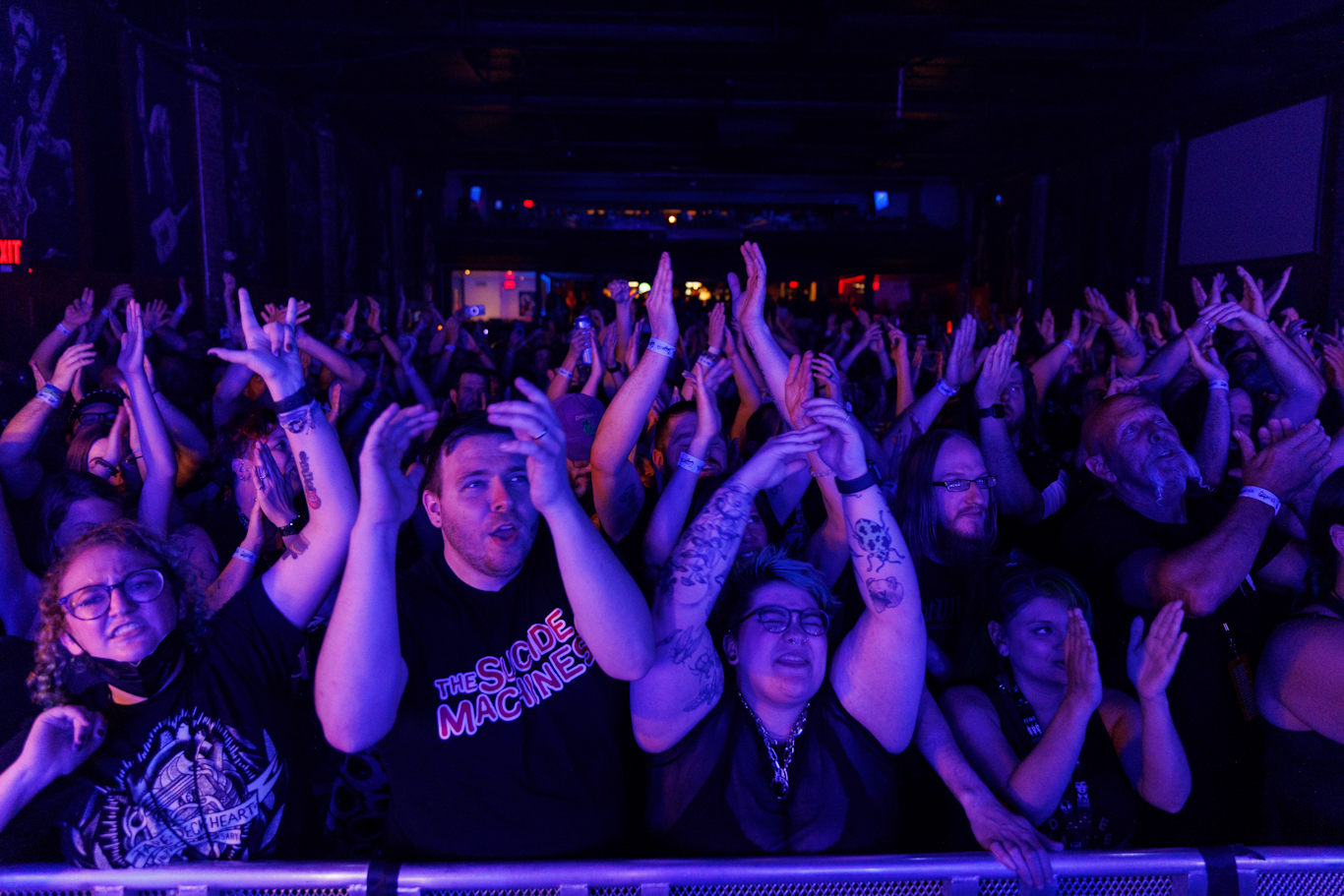
Show date: 19-May-2023
Venue: Bogart’s
Location: Cincinnati, OH
Frank Turner Set List:
Punches
1933
Get Better
Recovery
Try This at Home
The Next Storm
Non Serviam
Haven’t Been Doing So Well
Polaroid Picture
Be More Kind/St. Christopher
If Ever I Stray
Photosynthesis
Out of Breath
I Still Believe
Four Simple Words

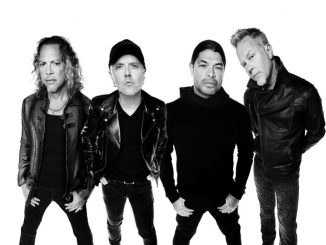
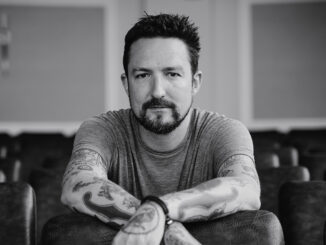


Be the first to comment